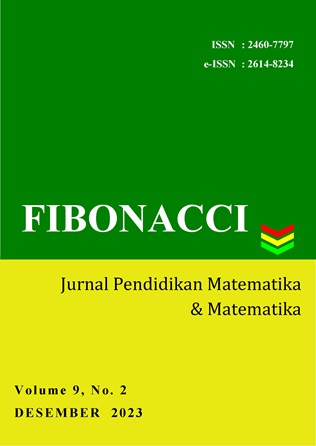SELF REGULATED LEARNING SEBAGAI PREDIKTOR KEMAMPUAN PEMBUKTIAN MATEMATIS CALON GURU MATEMATIKA
Main Article Content
Abstract
Article Details
Authors who publish with this journal agree to the following terms:
- Authors retain copyright and grant the journal right of first publication with the work simultaneously licensed under a Creative Commons Attribution License that allows others to share the work with an acknowledgement of the work's authorship and initial publication in this journal.
- Authors are able to enter into separate, additional contractual arrangements for the non-exclusive distribution of the journal's published version of the work (e.g., post it to an institutional repository or publish it in a book), with an acknowledgement of its initial publication in this journal.
- Authors are permitted and encouraged to post their work online (e.g., in institutional repositories or on their website) prior to and during the submission process, as it can lead to productive exchanges, as well as earlier and greater citation of published work (See The Effect of Open Access).
References
Agustyaningrum, N., Husna, A., Hanggara, Y., Abadi, A. M., & Mahmudi, A. (2020). Analysis of mathematical proof ability in abstract calgebra course. Universal Journal of Educational Research, 8(3), 823–834. https://doi.org/10.13189/ujer.2020.080313
Amelia, E., & Tjalla, A. (2016). Relationship Between Self Regulated Learning With Problem Solving Ability Learning Mathematics To Students in. October.
Asmar, A., & Hafizah, D. (2020). Hubungan Kemandirian Belajar Terhadap Kemampuan Berpikir Kritis Melalui Penggunaan Software Geogebra. 9(2), 221–230.
Astuti, V. D., Muthmainnah, R. N., & Rosiyanti, H. (2021). Pengembangan Media Pembelajaran Aplikasi Pokamathh Pada Materi Aljabar Kelas Vii. FIBONACCI: Jurnal Pendidikan Matematika Dan Matematika, 7(1), 1. https://doi.org/10.24853/fbc.7.1.1-10
Azizah, & Wahyuningsih, S. (2020). Penggunaan Model Rasch Untuk Analisis Instrumen the Use of Rasch Model for Analyzing Test. J U P I T E K Jurnal Pendidikan Matematika, 3(1), 45–50.
Boone, W. J. (2016). Rasch analysis for instrument development: Why,when,and how? CBE Life Sciences Education, 15(4). https://doi.org/10.1187/cbe.16-04-0148
Chan, S. W., Ismail, Z., & Sumintono, B. (2014). A Rasch Model Analysis on Secondary Students’ Statistical Reasoning Ability in Descriptive Statistics. Procedia - Social and Behavioral Sciences, 129, 133–139. https://doi.org/10.1016/j.sbspro.2014.03.658
Duru, D. C., & Okeke, S. O. C. (2021). Self-regulated learning skill as a predictor of mathematics achievement: a focus on ability levels. Malikussaleh Journal of Mathematics Learning (MJML), 4(2), 86. https://doi.org/10.29103/mjml.v4i2.5708
Fauziah, R., Hasanuddin, H., & Nuh, Z. M. (2019). Pengaruh Penerapan Model Pembelajaran Meaningful Instructional Design (MID) terhadap Kemampuan Pemahaman Konsep Matematis berdasarkan Self Regulated Siswa SMP/MTs. JURING (Journal for Research in Mathematics Learning), 2(3), 211. https://doi.org/10.24014/juring.v2i3.8073
Frey, N., Fisher, D., & Hattie, J. (2017). Surface, Deep, and Transfer? Considering the Role of Content Literacy Instructional Strategies. Journal of Adolescent and Adult Literacy, 60(5), 567–575. https://doi.org/10.1002/jaal.576
Güler, G. (2016). The Difficulties Experienced in Teaching Proof to Prospective Mathematics Teachers: Academician Views. Higher Education Studies, 6(1), 145. https://doi.org/10.5539/hes.v6n1p145
Herizal, H. (2020). Faktor yang Memengaruhi Kemampuan Pembuktian Matematis Siswa. Vygotsky, 2(1), 33. https://doi.org/10.30736/vj.v2i1.187
Kramarski, B., Weisse, I., & Kololshi-Minsker, I. (2010). How can self-regulated learning support the problem solving of third-grade students with mathematics anxiety? ZDM - International Journal on Mathematics Education, 42(2), 179–193. https://doi.org/10.1007/s11858-009-0202-8
Lesmanawati, Y., Rahayu, W., Kadir, K., & Iasha, V. (2020). Pengaruh Self Regulated Learning terhadap Kemampuan Berpikir Kreatif Matematis Siswa Sekolah Dasar. Jurnal Basicedu, 4(3), 593–603. https://doi.org/10.31004/basicedu.v4i3.400
Marlibi, M., Aspin, A., & Silondae, D. P. (2021). Self-Regulated Learning Dengan Prestasi Belajar Matematika Dan Bahasa Inggris. Jurnal Sublimapsi, 2(2), 1. https://doi.org/10.36709/sublimapsi.v2i2.11453
Miatun, A., & Khusna, H. (2020). Pengaruh geogebra online berbasis scaffolding dan tingkat self regulate learning terhadap kemampuan berpikir kritis. Pythagoras: Jurnal Pendidikan Matematika, 15(2), 124–136. https://doi.org/10.21831/pg.v15i2.34499
Nahdi, D. S. (2017). Self Regulated Learning sebagai Karakter dalam Pembelajaran Matematika. The Original Research of Mathematics, 2(1), 20.
Perbowo, K. S., & Pradipta, T. R. (2017). Pemetaan Kemampuan Pembuktian Matematis Sebagai Prasyarat Mata Kuliah Analisis Real Mahasiswa Pendidikan Matematika. KALAMATIKA Jurnal Pendidikan Matematika, 2(1), 81. https://doi.org/10.22236/kalamatika.vol2no1.2017pp81-90
Ranti, M. G., Budiarti, I., & Trisna, B. N. (2017). Pengaruh kemandirian belajar (self regulated learning) terhadap hasil belajar mahasiswa pada mata kuliah struktur aljabar. Math Didactic: Jurnal Pendidikan Matematika, 3(1), 75–83. https://doi.org/10.33654/math.v3i1.57
Ruswana, A. M., & Zamnah, L. N. (2018). Korelasi antara Self-Regulated Learning dengan Kemampuan Pemahaman Matematis Mahasiswa. Mosharafa: Jurnal Pendidikan Matematika, 7(3), 381–388. https://doi.org/10.31980/mosharafa.v7i3.143
Sari, C. K., Waluyo, M., Ainur, C. M., & Darmaningsih, E. N. (2018). Logical errors on proving theorem. Journal of Physics: Conference Series, 948(1). https://doi.org/10.1088/1742-6596/948/1/012059
Viki, V. F., & Handayani, I. (2020). Kemampuan Komunikasi Matematis Berdasarkan Self-Efficacy. Transformasi : Jurnal Pendidikan Matematika Dan Matematika, 4(1), 189–202. https://doi.org/10.36526/tr.v4i1.906
Zamnah, L. N. (2017). Hubungan Antara Self-Regulated Learning Dengan Kemampuan Pemecahan Masalah Matematis Pada Mata Pelajaran Matematika Kelas Viii Smp Negeri 3 Cipaku Tahun Pelajaran 2011/2012. Teorema, 1(2), 31. https://doi.org/10.25157/.v1i2.549

